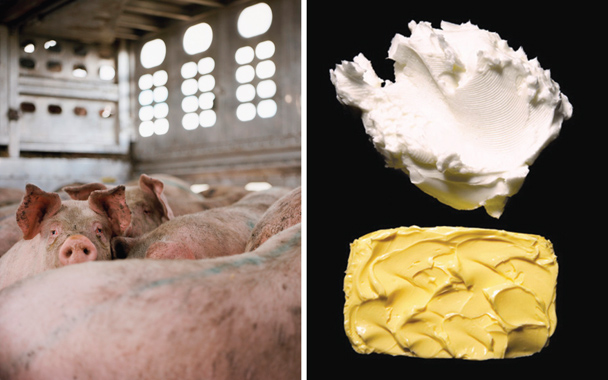Superbugs
The more chicken and pork a woman eats, the more likely she is to develop antibiotic-resistant urinary tract infections (UTIs) caused by E. coli.
That was the conclusion of a study led by McGill University’s Amee R. Manges and reported in the December issue of the journal Foodborne Pathogens and Disease.
The research “provides epidemiologic evidence that antimicrobial resistant, UTI-causing E. coli could have a food reservoir, possibly in chicken or pork,” said the authors.
News about antimicrobial-resistant bacteria in gigantic meat-processing facilities is coming to light much too often for my comfort. A December paper by Johns Hopkins University scientists showed that workers in poultry processing plants were 32 times more likely than the rest of us to carry resistant E. coli in their own digestive tracts and might be vectors for transmitting the germs to the general public.
Evolution of these antibiotic-resistant superbugs is completely unnecessary. The Union of Concerned Scientists points out that 70 percent of all antibiotics used in the United States are administered to domestic animals for non-therapeutic purposes—not to cure disease, but merely to make “animals grow faster in the over-crowded and unsanitary conditions on large-scale confinement facilities known as factory farms.”
To put that in perspective, eight times as many antibiotics are given to uninfected animals as are administered to humans suffering genuine bacterial infections.
To avoid these brave new bacteria, stick to meats bearing the USDA’s “Organic” logo or the phrase “no antibiotics added.”
In Praise of Trans Fats?
Banned in restaurants in New York, Boston, Chicago, and other jurisdictions across the country, trans fats are the arch villains of today’s dietary world. They wreak havoc on virtually every aspect of the cardiovascular system.
Now it looks like they’re not all so bad. But before you race into the kitchen to slather a big dollop of margarine on those soda crackers you’ve been avoiding, read on.
In the March issue of the American Journal of Clinical Nutrition, Jean-Michel Chardigny reports that the Europe-wide study he led showed that trans fats found naturally in dairy products and meats do not have the negative health effects of their industrial counterparts. Specifically, Chardigny and his colleagues found that manufactured trans fats in the form of partially hydrogenated vegetable oils reduced the levels of HDL cholesterol (so-called “good” cholesterol) in subjects who consumed them. The same amount of trans fat from natural sources had no such negative effects.
So does that mean we can eat all the beef, bacon, and butter we want? Sorry.
Commenting on Chardigny’s research in the same issue of the journal, nutrition experts Walter Willett and Dariush Mozaffarian, both affiliated with Harvard University, said that the take-home message was that manufactured trans fats should be replaced in our diets by unsaturated fats—those that come from sources such as olive oil, for instance—rather than fat from meat and dairy products.




 Pinterest
Pinterest


